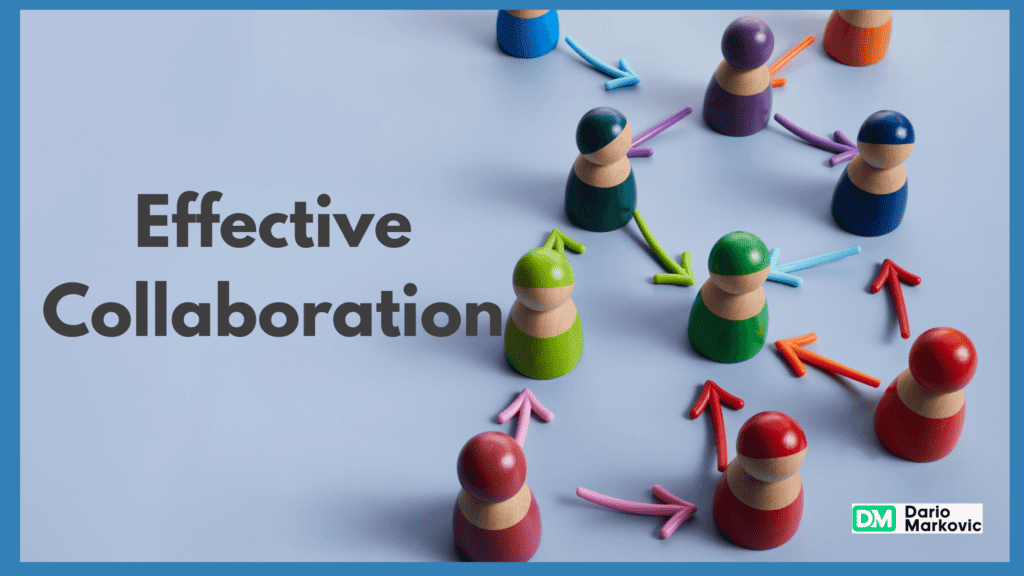Mastering teamwork skills is no longer just a nice-to-have; it’s an absolute must in today’s workplace.
We unravel the pivotal nature of good teamwork skills for your professional journey, illuminated by employer preferences and the significant influence of technological advancements on group interactions.

You’ll walk away with insights on important teamwork skills, from effective communication to conflict management and everything in between. We’re not leaving out leadership—understanding its impact on teams is vital.
We’ve also lined up real-world examples of successful teamwork across various industries. Because we know tech is reshaping collaboration, you’ll see how it enhances teamwork.
What is the Importance of Teamwork Skills?
Teamwork skills are not just a nice-to-have but a must-have in the modern workplace. Today’s employers prioritize finding folks who can seamlessly work together, share ideas, and add value to the collective achievements of their teams.
This demand is backed by data from the National Association of Colleges and Employers, highlighting teamwork as one of the top skills employers seek.
Why Employers Value Teamwork?

Why do employers value teamwork so much? First, strong teamwork skills enhance problem-solving efficiency. The convergence of varied thought processes in a team setting often leads to groundbreaking resolutions.
Moreover, robust teamwork skills create a nurturing atmosphere where everyone feels appreciated and integral, enhancing contentment at work and encouraging people to stay longer.
1. Mastering Teamwork Skills
However, mastering teamwork skills involves honing soft skills such as active listening, conflict management, critical thinking, and decision-making.
Active listening skills allow you to understand your teammates better while becoming a team player, and conflict management ensures disagreements don’t derail progress.
Critical thinking pushes the team towards a more intelligent solution, whereas good decision-making seals those choices into action.
2. Building Essential Qualities
Building these essential qualities within yourself or your team members doesn’t happen overnight; it takes time and deliberate effort.
One way to do this is to set personal goals and relevant skills around improving communication abilities or practicing empathy by understanding nonverbal cues like eye contact during conversations.
3. Enhancing Emotional Intelligence
If you aim to become a stellar team player or cultivate excellent teamwork skills within your organization, make sure you also focus on enhancing emotional intelligence.
This significantly boosts relationship building, another key ingredient for successful team building skills, collaboration in person or across virtual teams.
4. Role of Technology in Teamwork
In essence, developing robust teamwork skills is directly related to achieving professional success, hence why technology plays an increasing role today.
It facilitates seamless collaborative work regardless of geographical barriers, ensuring company goals are met efficiently. This showcases good teamwork skills in the long run.
Key Takeaway:
Master teamwork skills, such as active listening and decision-making, to shine in the workplace. Employers crave this desirable teamwork skill because it leads to innovative solutions and a happier work environment.
Boosting your emotional intelligence and using technology can also help make team member collaboration more accessible, no matter where you are.
Core Teamwork Skills for Effective Collaboration

Effective collaboration relies on core teamwork skills, with communication as pivotal. The ability to engage in straightforward and concise dialogues often determines success or failure in achieving organizational goals.
Problem-solving is equally crucial. Teams proficient in creative thinking and conflict management overcome challenges, strengthening their collaborative environment.
This entails being open to honest feedback, nurturing good relationships within the group, and showing leadership when necessary.
Communication as the Foundation of Teamwork
Effective communication is paramount for fostering successful teamwork. It involves active listening, nonverbal cues like eye contact, and building team members’ trust. Clear and concise message delivery is essential for mutual understanding, as highlighted by a National Association of Colleges and Employers survey identifying strong communication skills as a top attribute employers seek.
Apart from verbal communication, soft skills such as time management, accountability, decision-making, goal setting, and emotional intelligence are vital for successful teamwork.
Time management demonstrates respect for others’ time, while accountability ensures each member takes responsibility for their actions.
Confident decision-making, aligned goal-setting, and high emotional intelligence contribute significantly to establishing a productive team environment conducive to organizational success.
The Role of Leadership in Fostering Productive Teams

It’s not just about making orders or establishing goals. The force of leadership blends individual efforts into an overall victory, linking individual efforts to collective success.
A leader’s influence significantly enhances the team’s spirit, which propels the group and the group toward its intended goals.
In the rapidly changing professional environment, leadership has become essential to creating a place that encourages innovation, and hurdles become stepping stones to progress.
A well-balanced mix of direction and flexibility lets teams reach new heights, which proves that a solid leadership system is the foundation of any successful business.
Communication as the Foundation of Teamwork
Effective communication stands as the cornerstone of any thriving team. Leaders who excel in clear messaging foster an environment where everyone feels heard and valued.
This open line facilitates better understanding and encourages sharing innovative ideas freely within the group setting.
Beyond verbal exchanges, nonverbal cues like eye contact play a significant role in building trust among team members—a subtle yet powerful aspect often overlooked.
Enhancing Team Dynamics with Emotional Intelligence
Leaders with high emotional intelligence (EQ) adeptly manage diverse personalities, ensuring inclusivity and understanding. They intuitively perceive underlying issues, fostering team harmony through proactive measures.
Emotional intelligence is pivotal for successful team dynamics, enabling compassionate understanding within collective environments.
Research indicates that emotionally intelligent teams exhibit superior cooperation, fostering a nurturing atmosphere that values every member’s emotions and contributions.
Creating such an environment demands dedication and ongoing skill development. Leaders must consistently hone their emotional intelligence to cultivate a harmonious and effective team culture.
The Pillars of Emotional Intelligence in Teams
Let’s discuss self-awareness. Knowing your emotions sincerely can help you navigate conversations carefully and ensure your responses lift your group’s spirits.
Social awareness: focusing on the mood and emotions of the people around you could be as simple as keeping your eyes open in conversations or interpreting non-verbal signals. These behaviors speak volumes about respect and care for other team members’ viewpoints.
Last but not least is relationship management–maintaining good relationships through effective communication strategies like active listening or giving honest feedback with an open mind ensures conflicts are resolved amicably before they escalate into more significant issues.
The Impact on Productivity
Teams infused with emotional intelligence get along better and achieve their goals more efficiently. Understanding each other reduces friction, letting everyone focus on what matters: getting great results together.
According to the article, teamwork tops employers’ wish lists every year precisely because effective teamwork correlates with higher productivity.
Conflict Management within Teams

Effective conflict management strategies are vital to maintaining harmony and encouraging collaboration in any group setting. When conflicts occur, as they always do, the ability to manage these issues with respect and an open mindset can make a difference.
The ability to show interest in the other’s thoughts is essential to resolving disagreements peacefully. Using this approach does more than smother the flames of potential conflict; it creates a way for new solutions to arise from various perspectives.
Respect is the keyword here. It acts like the oil that lubricates an engine, minimizing friction even though parts may move against one another.
How do you create this kind of atmosphere? Begin by actively listening. Listening actively goes beyond listening to words. It involves comprehending the message being communicated and acknowledging it without judgment or interruption.
It’s about allowing room for voices regardless of whether they differ from your perspective.
The Role of Emotional Intelligence
A high emotional intelligence (EQ) level is pivotal in managing conflicts effectively within teams. Individuals with strong EQ are better equipped to identify their emotions and those of others, which allows them to navigate interpersonal relationships judiciously and empathetically.
This skill set is precious when tensions rise because emotionally intelligent individuals can recognize underlying issues behind overt symptoms of conflict.
By addressing these root causes directly—miscommunications or unmet expectations—they help prevent similar problems from arising.
Fostering a climate of trust among colleagues goes beyond merely dodging conflicts; it involves laying down a bedrock of confidence, paving the way for open dialogue and candid exchanges—key catalysts for perpetual growth and ingenuity in any group setting.
Examples of Successful Teamwork Across Industries

Regardless of industry type or size, all successful businesses have harnessed the power of great teamwork. Examples abound, from tech giants to healthcare, where collaborative efforts have led to unprecedented successes.
In the world of technology, for instance, product development cycles are often tight and demanding. Here, teams comprising software developers, designers, and project managers work closely together in a highly dynamic environment.
The synergy between these professionals is vital for pioneering advancements and equally essential for ensuring products are launched on schedule, satisfying the needs of a fast-paced market.
In building and design, the synergy between architects, engineers, and laborers showcases a textbook example of how varied expertise converges to breathe life into architectural visions while ensuring safety and punctuality.
Architects, engineers, and construction workers collaborate to turn blueprints into reality while adhering to safety standards and deadlines. This sector demonstrates how diverse skill sets blend seamlessly to achieve complex objectives.
Why Employers Value Teamwork?
An essential facet behind employers’ emphasis on teamwork skills is its direct correlation with professional success. According to a National Association of Colleges and Employers survey, teamwork ranks high among desired attributes in new hires. Those who excel at teamwork bring immense value through enhanced productivity and creativity.
Beyond mere output and efficiency gains lie more profound benefits such as improved workplace morale and more robust corporate culture—factors pivotal for long-term success across industries.
The realization that teamwork amplifies creativity and productivity explains why there’s a significant push toward nurturing spaces where collaboration flourishes from Silicon Valley garages to worldwide enterprises’ boardrooms.
How Technology Enhances Team Collaboration
The evolution of technology has transformed team dynamics, enhancing business connectivity like never before. Various tools, from video conferencing to project management software, underscore the pivotal role of technology in nurturing essential teamwork skills.
Virtual teams necessitate advanced chatting infrastructures like Slack and Zoom, which facilitate real-time discussions and ensure seamless collaboration across different locations. These platforms streamline workflow by allowing efficient task delegation, precise goal setting, and meticulous progress tracking.
Moreover, technology fosters team relationship-building through features like emoji reactions and GIFs, adding a personal touch to digital interactions among remote workers.
Employers now prioritize individuals with solid teamwork skills augmented by technological proficiency, as this blend defines the success of modern teams across industries in achieving critical outcomes.
My Experience with the Importance of Teamwork Skills
Learning to excel in working together can profoundly reshape one’s professional journey. It’s clear now. Effective communication with leadership and emotional intelligence are the building blocks of successful collaboration.
Employers crave team players who thrive in group settings, tackle conflicts gracefully, and work together to achieve company goals. Teamwork skills shine. Tech tools have only upped the game, making seamless cooperation possible and expected.
To stand out, hone those soft skills, keep an open mind during conflict management discussions, and remember that great teamwork takes time but pays off big. Ready to elevate your company’s success through improved teamwork?
It starts today. Each time you connect, you edge nearer to becoming the indispensable ally everyone seeks in their squad.
Frequently Asked Questions
- Practice active listening to understand your team members better.
- Communicate openly and clearly with your team.
- Develop empathy to understand and appreciate different perspectives.
- Be adaptable and open to feedback.
- Foster a positive and collaborative attitude.
Communication is essential for effective teamwork. Clear and open communication ensures team members understand their roles, goals, and expectations. It also helps prevent misunderstandings and allows for exchanging ideas and feedback.
Diversity in a team brings different perspectives, experiences, and skills. This diversity can lead to more innovative solutions and a richer team dynamic. Embracing and respecting diverse viewpoints enhances the team’s ability to tackle challenges creatively.
Trust is built through consistency, reliability, and transparency. Deliver on commitments, communicate openly, and support your team members. Trust grows when individuals feel secure in their roles and confident in the reliability of their colleagues.
Teamwork skills can be developed through practice, self-reflection, and a willingness to learn. Engaging in team activities, seeking feedback, and actively improving communication and collaboration can contribute to developing practical teamwork skills.



